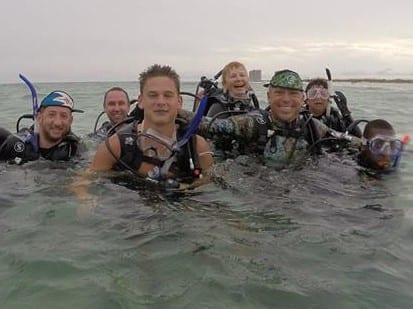By: Kerry Freeland / Dive Pros
The warm weather is approaching fast. I am reminded of the inevitable phone call I get every Memorial Day weekend, someone sitting on the beach, looking out over the Gulf of Mexico. “I am here for the weekend, and I want to learn to scuba dive”. As much as I would love to accommodate these folks there is just too much to cover in one weekend. In recent years the scuba courses have become more streamlined; the advent of the online training process allows 10 to 12 hours of academics to be completed at your leisure. Once that is completed you have some hours to spend in the pool, and all the training organizations require two days of diving in the open water to complete the course. In the day and age of instant gratification and next day shipping, the tendency is to take the shortest easiest route. It is a mistake to opt for the quickest diving course. There is no teacher like experience. Those who take this sport seriously seek the tutelage of mentors for many years after their first certification. If one can get a few more hours of knowledge out of their first course, do it. Scuba diving is something you can do safely into your later years, and if you are going to pay for the instruction of some lifelong activity, why not get a good education?
There are three components to the scuba certification process. You have the academic component, which will delve into the physics and the physiology of how being underwater affects you and your body. You will also learn what this new environment is like, and how it is different than what we are born into. The information contained therein is not overly challenging or difficult, but you need to know these things in order understand the basic “rules” of scuba diving.
The second component is the confined water, or pool training. This part of the training is equally important as the other phases, but really it is where the rubber meets the road. The confined water is where the student will learn the operation of the scuba kit, assembly, disassembly, usage, as well as the care and maintenance of the equipment. Once in the water with the gear you will learn how it works and how to configure it for comfort. You will learn mask clearing and replacement, as well as recovery and replacement of all the scuba equipment. We will practice sharing air, buddy assists, and buddy tows. And best of all, are the neutral buoyancy skills. Once mastered, you are freed from the bonds of gravity, you will then be able to float in the water column, at whatever depth you like. This is truly one of the most liberating experiences you can have. The more time your allowed to work on these skills the better diver you will become.
Now we are ready for the third component of the scuba certification, the open water dives. We use several sites for the open water dives. The site visited will be determined by many variables, weather and environmental conditions being the most important factors. Divers are expected to duplicate the skills covered in the confined water while out in the “real world” environment. Easy enough, you’ve already done this in the pool. Once these skills are demonstrated it is time for the fun. The environmental tour, as we call it, should give you the opportunity to swim around surveying to scenery while displaying good buoyancy skills. Our students get to see a diverse array of marine life. We regularly interact with curious wrasse, shy octopus and puffers, swarms of spadefish, mullet, and snappers. I will regularly dive one of our training sites, just as I have for the last thirty plus years. It is the same site, but every dive is a little different. I am in for life.
Learning to scuba dive is not something you should do in a weekend. Learning to scuba dive requires a little more preparation and planning. Take the time to get a more moderately paced course that gives you plenty of time to hone skills in the pool; it is worth the effort and your time. If you approach the course with these facts in mind you will realize that your scuba certification is actually, “a license to learn more”. I have been teaching scuba for the better part of my existence, my goal is to make “true” divers. If I, and my people, do our job, you will be in for life.
Jacques Yves Cousteau Quotes. “From birth, man carries the weight of gravity on his shoulders. He is bolted to earth. But man has only to sink beneath the surface and he is free”.
Dive Pros
7203 West Highway 98 * Pensacola FL 32507
Phone: (850) 456-8845 * Fax: (850) 456-0025
florida-divepros.com
